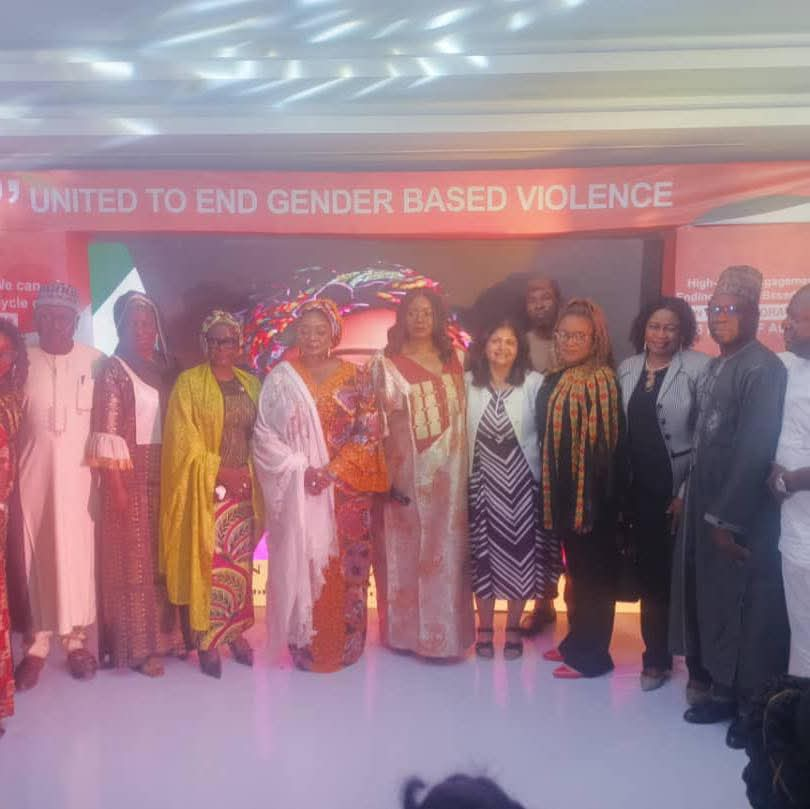The Federal Government has restated its determination to eliminate all forms of Gender-Based Violence (GBV) in the country, including the rising wave of technology-facilitated abuse targeting women and girls.
This renewed commitment was declared on Monday at the Envoy Hotel, Abuja, during a high-level engagement marking Nigeria’s national launch of the 2025 global 16 Days of Activism Against Gender-Based Violence with the theme: “UNiTE! End Digital Violence Against All Women and Girls.”
Speaking at the event, the Honourable Minister of Women Affairs and Social Development, Hajiya Imaan Sulaiman-Ibrahim, FSI, said Nigeria stands at a decisive moment in its fight against violence perpetrated against women and girls. She stressed that while gender-based violence remains one of the country’s most pervasive human rights violations, government is committed to shifting the narrative from statistics to decisive, coordinated action.
She expressed concern over the nation’s current security and social climate, referencing mass abductions of women and girls, conflict-related abuses, and entrenched impunity, which collectively threaten national stability and women’s freedom to live and work without fear.
Citing data from the 2018 National Demographic and Health Survey (NDHS), the Minister noted that 28% of Nigerian women aged 15–49 have experienced physical violence, 40% emotional violence and 7% sexual violence. She also recalled the 149% spike in GBV cases during the COVID-19 lockdown, juxtaposed with a conviction rate still below 5%.
However, she highlighted signs of progress in the 2024 NDHS, which indicates modest declines in child marriage (42%) and female genital mutilation (18%). She pledged the Ministry’s commitment to consolidating these gains through the 9-Pillar Renewed Hope Social Impact Intervention Programme (RH-SIIP-774).
Sulaiman-Ibrahim announced ongoing government investments in survivor-centered services, digital empowerment programmes, specialised gender courts, safe spaces, and the establishment of a national GBV Emergency Response Fund.
“Survivors remain at the heart of our national response.”
“Their courage shapes our policies and strengthens our resolve to deliver justice, dignity, and protection to every woman and girl”, the Minister said.
She maintained that by reaffirming Nigeria’s long-term vision to build a nation where women and girls are safe, empowered, and able to fulfil their potential.
Earlier in her welcome remarks, the Permanent Secretary of the Ministry, Dr. Maryam Ismaila Keshinro, emphasized the importance of strengthening coordination, improving data-driven interventions, and ensuring that national commitments translate into measurable outcomes.
“Only through collaboration, constructive engagement, and shared ownership can we achieve lasting change,” she noted.
Also speaking, Nabila Aguele, Board Member of Women for Women International and Chief Executive, Nigeria, Malala Fund, described GBV as a global crisis, revealing that one in three women globally will experience violence in their lifetimes—10% of whom are Nigerians
“GBV is not inevitable,” she stressed.
“It is a tool used to silence and intimidate women. But through community-driven solutions and sustained political will, we can end this crisis.”
Aguele underscored the link between girls’ education and reduced GBV, adding that Malala Fund continues to champion universal secondary education for girls.
She also celebrated the presence of Ms. Thelma Ekiyor, the new International CEO of Women for Women International, describing her appointment as a major boost to global anti-GBV efforts.
She shared the testimony of Tami Wophill, a Women for Women International trainer, who said increased awareness of rights is already reducing violence in communities.
Representing the UNDP, Ms. Elsie Attafuah, Resident Representative, drew attention to the rise of digital violence alongside Nigeria’s rapidly growing digital economy. She noted cases of cyberstalking, online harassment and non-consensual sharing of intimate images as increasingly common risks.
“Nigeria’s digital future cannot coexist with digital harm,”
Attafuah warned.
“We must strengthen digital safety systems, modernize legal frameworks, and ensure that women and girls can participate and innovate online without fear.”
The event, organised by the Ministry of Women Affairs in partnership with Women for Women International and the UNDP, marks a key step in Nigeria’s national mobilisation toward ending all forms of violence against women and girls.
By Sophina Ovuike, Abuja
























